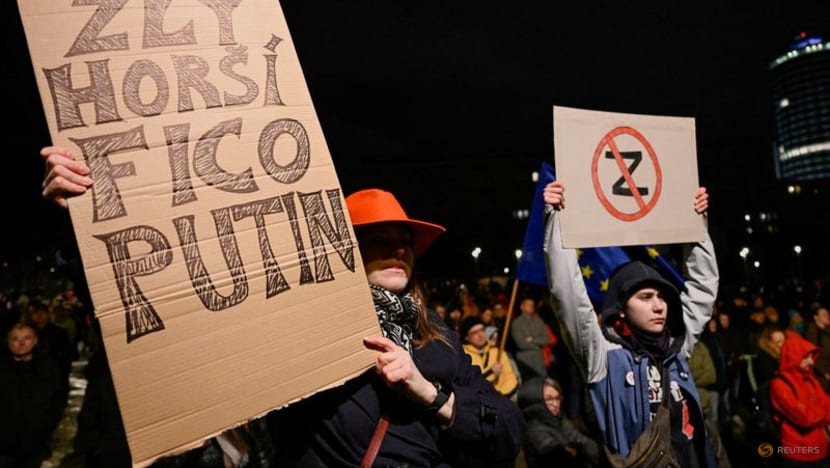Concern brews over Russian disinformation in Slovakia as voters cast ballots in European election
While Moscow has denied spreading disinformation in Europe, recent studies suggest that Kremlin narratives have become mainstream among some Slovaks.


This audio is generated by an AI tool.
BRATISLAVA, Slovakia: Authorities and experts are worried about the impact of pro-Kremlin influence campaigns on the ongoing European parliamentary election, with Slovakia in particular having grappled with such operations for years.
Polls opened across the European Union (EU)’s 27 member states on Thursday (Jun 6).
Authorities in Brussels, the EU’s de facto capital, have flagged that Russian disinformation could pose a challenge for some of the bloc’s smaller member states like Slovakia.
The small eastern European nation was part of the Soviet Union before gaining independence in 1993.
Over the last three decades, it has chartered a course towards the West, marking 20 years of EU and North Atlantic Treaty Organization (NATO) membership this year.
This has not gone unnoticed by the Kremlin.
According to Slovak lawmakers and security officials, Russia has tried to exert its influence on Slovakia’s society and politics for years.
Before the country’s last elections in 2023, Slovak President Zuzana Caputova warned that Russian disinformation, spread primarily on social media, was taking root and would lead to fragmentation and polarisation across the country.
Questions have emerged on whether EU and NATO membership means Slovakia has sufficient safeguards in place to mitigate against nefarious Russian intervention and influence on its democratic institutions.
SLOVAKIA TURNING PRO-RUSSIAN?
While Moscow has denied spreading disinformation in Europe, instead accusing the West of waging a full-scale information war, recent studies suggest that Kremlin narratives have become mainstream among some Slovaks.
About half blame the West and Ukraine – which borders Slovakia to the west – for Russia’s invasion of Ukraine in 2022, while just 41 per cent blame Russia.
Only 30 per cent of Slovaks think that Ukraine should join NATO or the EU – the lowest level of any EU member country.
In the nation’s 2023 election, Slovaks elected a Russia-friendly government and president, prompting a complete U-turn in its political direction.
Prime Minister Robert Fico, who was then elected for a third term after resigning from office in 2018, fulfilled his election campaign promise of cutting off all military support for Ukraine. He said Kyiv was under the United States’ influence and was no longer sovereign.
Mr Fico has also made efforts to mark Russian memorial days in Slovakia, including at the Soviet war memorial in the Slovak capital of Bratislava.
Meanwhile, his government dismantled the country’s counter-disinformation unit, which had been debunking what it identified as Moscow’s false narratives.
The former chair of the Slovak parliament’s defence committee Juraj Krupa claimed that under the current government, the reach of Russian propaganda has been growing.
“The most difficult thing is to fight the disinformation, and the Russia narrative is almost impossible without government interference,” the member of parliament told CNA.
“WE ARE NOT A BUFFER ZONE FOR BRUSSELS”
While on the campaign trail for the European election, Mr Fico’s governing SMER party framed Russia’s invasion of Ukraine as being the result of Western provocation.
Their coalition partners in government, the far-right Slovak National Party, are running the slogan “We are not a buffer zone for Brussels”.
At a campaign rally in a venue partially funded by the EU, SMER’s deputy leader Lubos Blaha criticised EU policy in Ukraine and warned of an EU superstate which could order Slovak troops to war.
“I don’t want to have a future where some in Brussels will decide that my son will be a soldier in the war against Russia,” he told CNA.
“I don’t feel any hatred against Russia. The Russians, they liberated us in the Second World War from fascism, and … we can’t forget this. That's why I think that the most pragmatic way to finish this war is to sit on the table and to have some peace settlement.”
Mr Blaha added: “It’s not that we are pro-Russia. We don't agree with the political or military action of Russia against Ukraine, and we cannot agree.”
Nevertheless, experts said that the SMER party’s talk of peace is not rooted in the reality of the Russia-Ukraine war.
Ms Oleksandra Hordon, project coordinator at global think tank Centre for Global Europe, noted that the party’s talk of peace is on Russian terms – completely opposite of what Ukrainians want and are fighting for.
“If Russia ended its war today, there would be no war, and if Ukraine ended the war today, there would be no more Ukraine,” she stressed.
“So I think we should listen to the Ukrainian leadership, to the Ukrainian people, consider the common values that Ukrainians are currently fighting for and continue the support for Ukraine,” she added.
Despite the dramatic shift in the new Slovak’s government’s rhetoric, most Slovaks - around 70 per cent - still think their country's fortunes should be aligned with its Western allies.
They will now have their say on whether to lean back on the country's historic Russian ties, or continue to forge its future with the West.
The European parliamentary election polls close on Sunday.
















